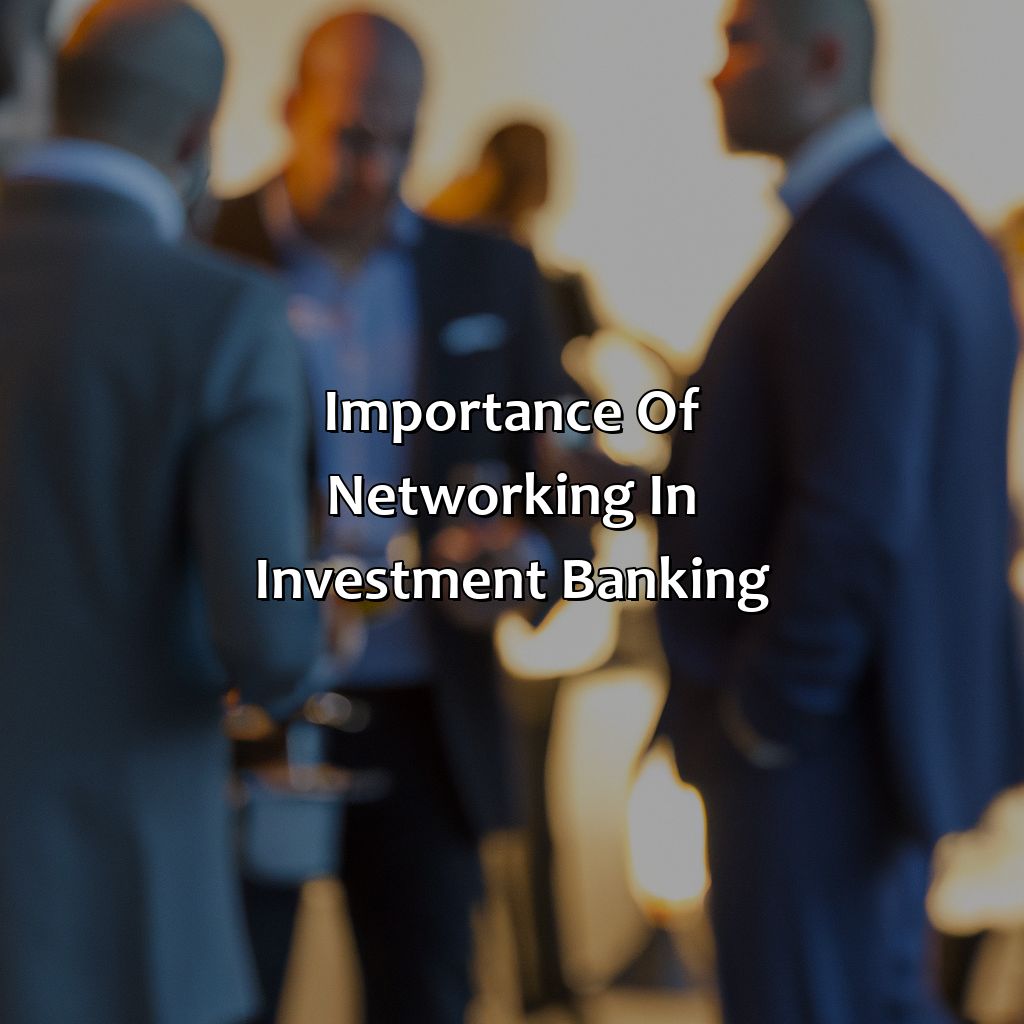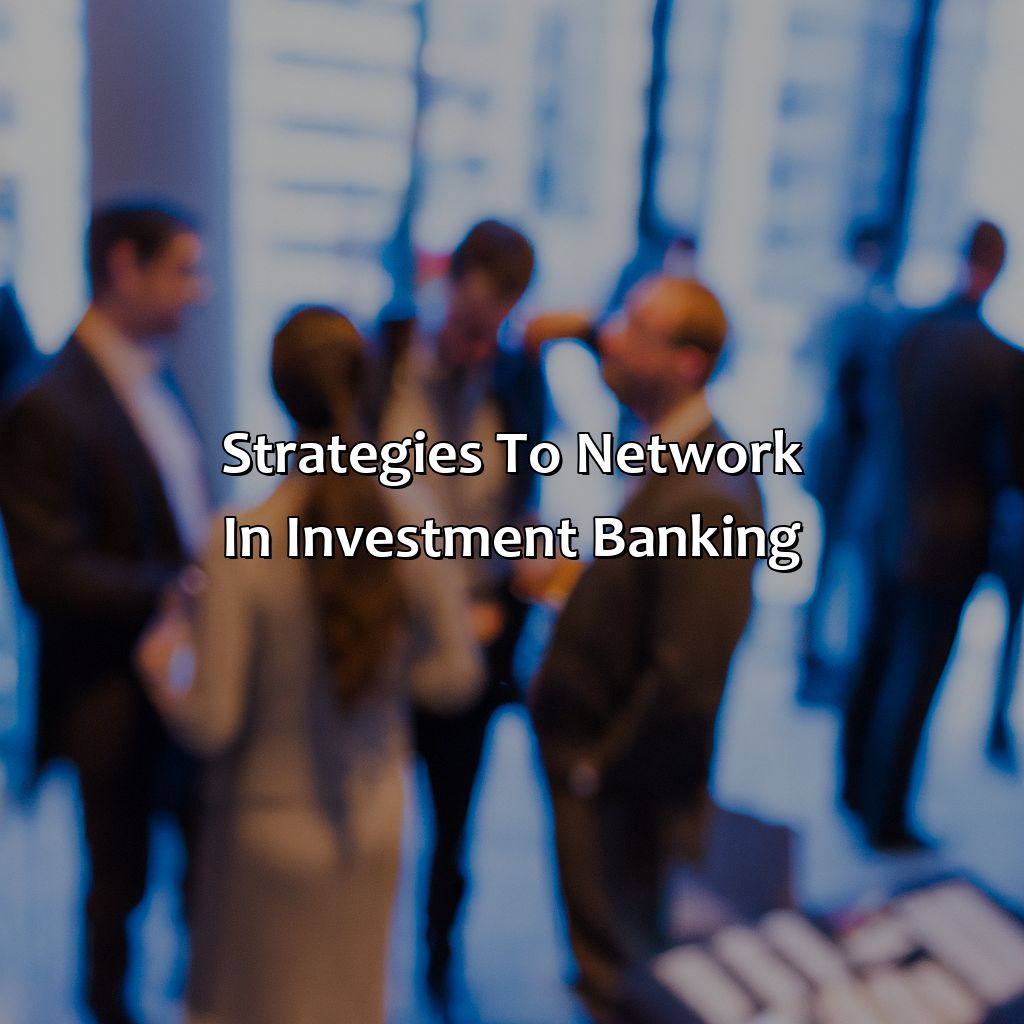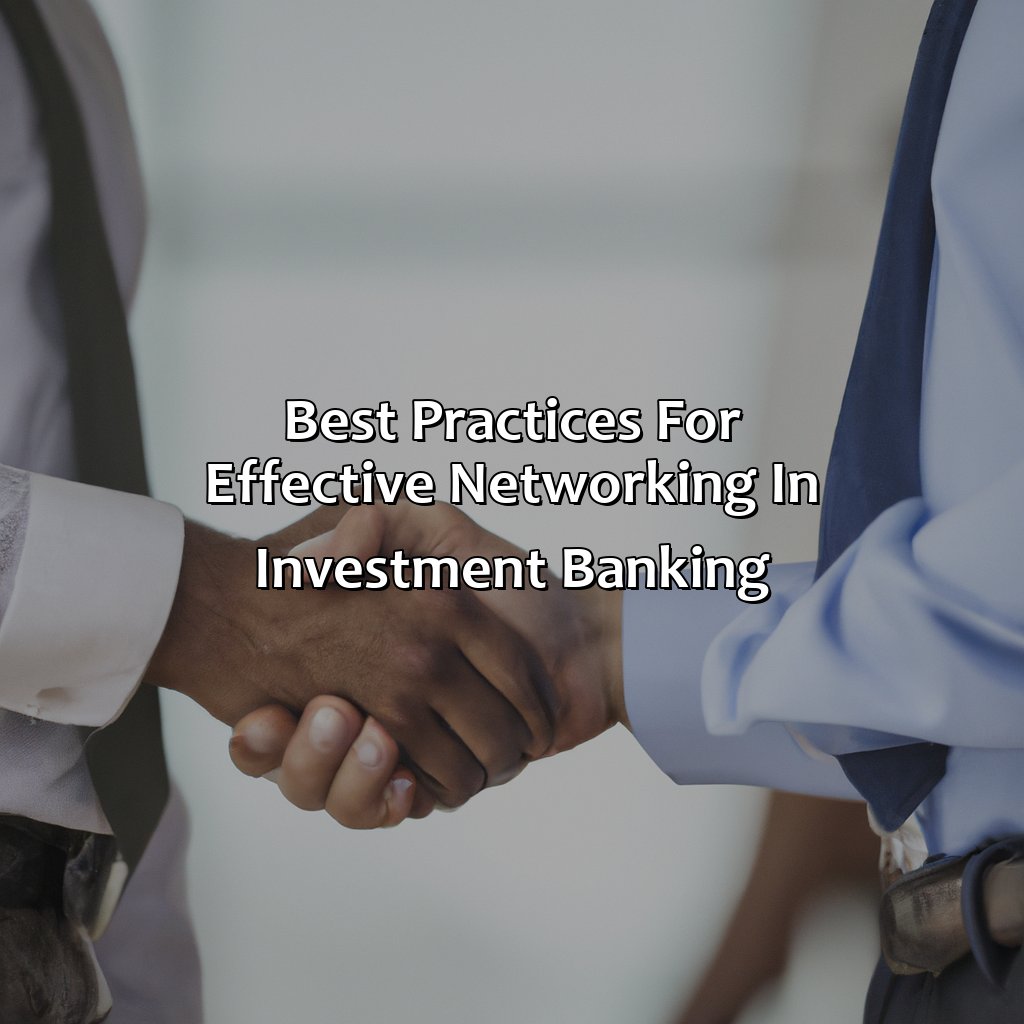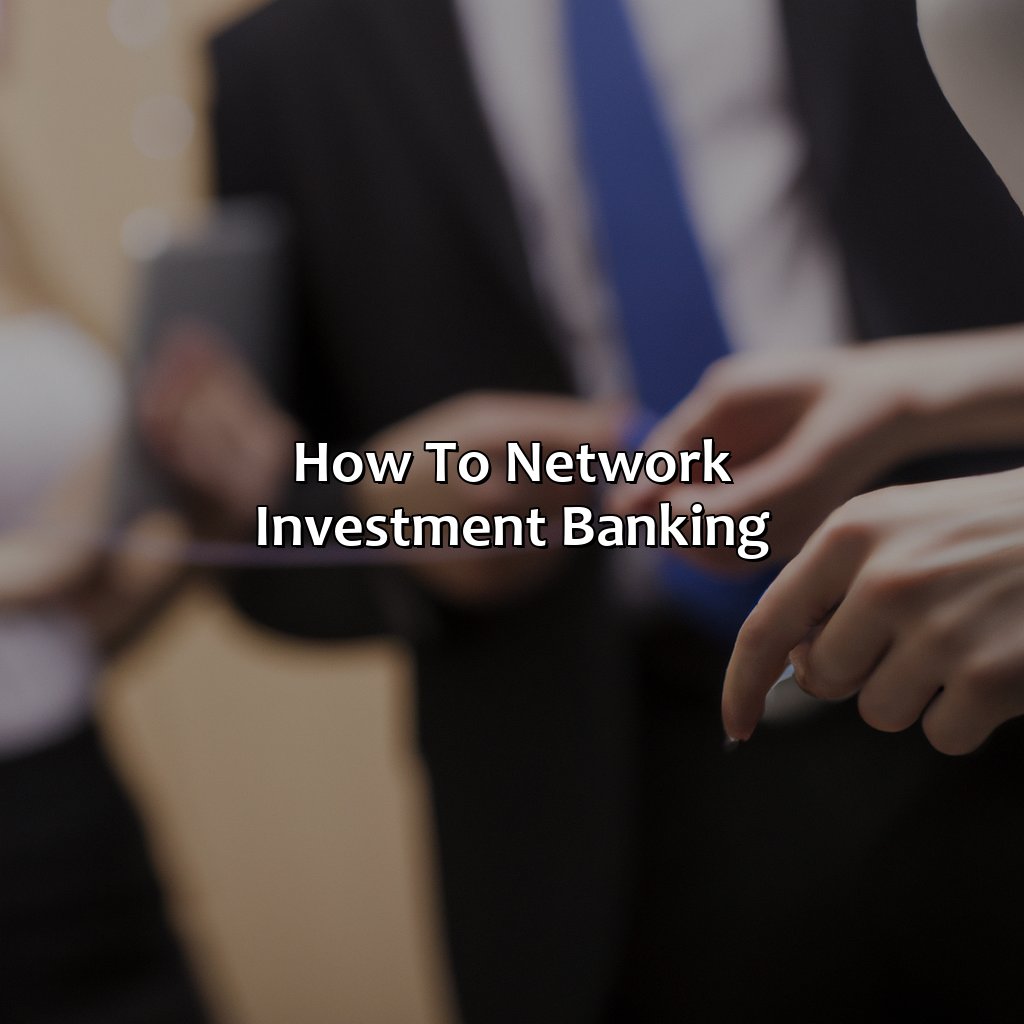How To Network Investment Banking?
Key Takeaway:
- Networking is crucial to succeeding in the investment banking industry, as it can help to build relationships with key players and open doors to new opportunities.
- To effectively network in investment banking, it’s important to first understand the industry and its key players, as well as to have a solid understanding of one’s own role and responsibilities.
- Some effective strategies for networking in investment banking include utilizing LinkedIn and other networking platforms, attending industry conferences and events, reaching out to alumni and other connects, and leveraging referrals and introductions.
Struggling to connect with potential employers in the investment banking industry? You’re not alone – with the right approach, networking can open the door to lucrative new opportunities. Learn how to unlock your networking potential for success in investment banking.
Importance of Networking in Investment Banking
Networking plays a vital role in the success of investment banking. It allows for the creation of strong relationships, leading to potential avenues for deals and business opportunities. Building a solid network can aid in the process of finding potential clients and investors, which ultimately improves the overall performance of the investment bank.
In order to establish a successful network, investment bankers must focus on developing strong communication skills and a professional demeanor. Networking efforts can be centered around attending industry events and conferences, meeting with potential clients and investors, and connecting with professionals through social media platforms and other networking tools.
It is important to remember that networking is an ongoing process, and it requires consistency and persistence. Simply attending a few events and meeting a few people will not yield significant results. Investment bankers should focus on building genuine relationships and adding value to their network, by sharing useful insights and offering assistance whenever possible.
A true success story in networking involves an investment banker who developed a relationship with a potential investor over time, by remaining consistently in contact and providing valuable market insights. This eventually led to the investor committing to a significant investment in the banker’s firm. This highlights the importance of persistence and dedication in networking efforts, which can yield significant results in the long run.

Image credits: retiregenz.com by Joel Woodhock
Understanding the Investment Banking Industry
To grasp the investment banking world and thrive as a networker, you need to acquaint yourself with the key players and their functions. Let’s delve into this “Understanding the Investment Banking Industry” topic. We’ll study two vital subsections: “Key Players in the Investment Banking Industry” and “Roles and Responsibilities in Investment Banking”. Knowing the major figures and their roles will help you better navigate and network the industry.

Image credits: retiregenz.com by Joel Jones
Key Players in the Investment Banking Industry
The Investment Banking Industry holds many significant entities. These organizations, which are vital contributors to the global financial system, play an essential role in facilitating investment opportunities for individuals and corporations alike. An understanding of the Key Players in the Investment Banking Industry is crucial for career development.
Below is a Table containing relevant data that thoroughly explains the Key Players in this industry. The information provided includes details such as headquarters location, year established, and job market statistics.
| Key Players | Headquarters Location | Year Established | Job Market Statistics |
|---|---|---|---|
| Goldman Sachs | New York | 1869 | +36% job growth |
| Morgan Stanley | New York | 1935 | +14% job growth |
| JP Morgan | New York | 1799 | +15% job growth |
| Deutsche Bank | Frankfurt | 1870 | -10% job loss |
It is essential to note that Investment Banks typically specialize in one or more areas within this industry. It is also worth noting that top firms regularly recruit only from elite universities.
An interesting perspective on networking within the Investment Banking Industry involves leveraging non-traditional connections. Each individual has unique family, social, and educational backgrounds that can provide new avenues for meeting industry insiders.
I recall a friend who secured a summer internship with Goldman Sachs by reaching out to his high school alumni network. The alumnus had worked at Goldman Sachs and offered to pass along his resume directly to the hiring manager – prime evidence of how networking pays off!
Get ready to wear multiple hats – and not just the fancy ones from your pay rise – as you navigate the various roles and responsibilities in investment banking.
Roles and Responsibilities in Investment Banking
Investment Banking Roles and Duties entail market analysis, financial modeling, deal structuring, and assisting in underwriting. Professionals in this industry work with clients to procure funds through IPOs, private placements or mergers and acquisitions to grow businesses, expand product offerings, and diversify revenue streams. As a result of their involvement in high-value transactions, investment bankers are required to maintain expertise in niche markets and technology trends to keep up with the ever-evolving landscape.
In order to excel as an Investment Banker, one must be adept at networking; developing strong relationships with colleagues and clients alike is crucial. It is also essential to keep abreast of the latest market developments by attending industry conferences and seminars as well as learning new tools such as Artificial Intelligence-based algorithms that provide rapid insights into specific markets. As Investment Banking professionals frequently work long hours diligently crunching numbers while advising clients on nuanced deal structures, they must possess strong analytical skills paired with excellent communication abilities.
Those aspiring for roles within the investment banking industry should aim at building a strong foundation of subject matter expertise through formal education; however, those without related degrees can still apply if they have transferable skills that demonstrate critical thinking ability. Prospective candidates can connect with industry professionals primarily via social networks like LinkedIn by leveraging prior internships or by attending business school events where they can meet alumni or faculty members who have worked in investment banking firms.
Don’t miss out on opportunities within the Investment Banking Industry; start building your network today! Keep current by staying up-to-date with market data, news-flow, and technology advancements to prepare you for future challenges and growth in your career.
Good news, networking in investment banking isn’t as complicated as derivatives trading, but bad news – it’s still not as easy as ordering a latte from Starbucks.
Strategies to Network in Investment Banking
Networking in investment banking? Maximize efficiency with these strategies!
- Use LinkedIn and other networking platforms.
- Attend industry conferences and events.
- Reach out to alumni and other contacts.
- Leverage referrals and introductions to close deals.
Boom!

Image credits: retiregenz.com by Joel Woodhock
Utilizing LinkedIn and other Networking Platforms
To effectively network in investment banking, taking advantage of digital platforms like LinkedIn and other networking sites is crucial. Here are some ways to make the most of these resources:
- Build a strong online presence by optimizing your profile, using keywords relevant to the industry, and showcasing your accomplishments.
- Join LinkedIn groups related to investment banking and engage with members by commenting on posts and sharing valuable insights.
- Attend virtual networking events hosted by investment banking associations or clubs, such as those offered through schools or professional organizations.
- Establish genuine relationships with professionals in the industry by sending personalized messages or connecting through mutual contacts.
It’s important to remember that networking is not just about making connections; it’s about building meaningful relationships that can benefit both parties in the long run. To stand out from the crowd, offer value to your connections rather than solely focusing on what they can do for you.
Finally, according to a study conducted by DHI Group Inc., 85% of recruiters use LinkedIn to find qualified candidates. Therefore, maintaining an active and impressive online presence could increase job opportunities within investment banking.
Attending industry conferences and events: Where else can you network with the same enthusiasm as Olympic sprinters chasing after gold medals?
Attending Industry Conferences and Events
Networking at industry events and conferences can boost your success in investment banking. These events offer opportunities to meet new people, learn about market trends, and exchange valuable insights. By attending these gatherings, you can connect with potential business partners or mentors who may lead you to exciting career prospects.
To maximize the benefits of attending industry events, it is essential to prepare ahead of time. Research the attendees, speakers, and topics before arriving to identify potential networking opportunities and conversation starters. Introduce yourself with a succinct elevator pitch that tells the listener who you are and what you do.
During the event, avoid staying glued to familiar faces or colleagues – instead, seek out new connections by approaching individuals or groups who share common interests or career goals. Engage in meaningful conversations by asking thoughtful questions and actively listening to their responses.
Lastly, be sure to follow up after the event. Connect with those you met on LinkedIn or via email to continue discussions or schedule future meetings.
According to a report by Statista in 2020, over 90% of professionals believe that attending events such as conferences is essential for networking within their industry.
Who needs friends when you can network with your alma mater and their wealthy friends?
Reaching out to Alumni and Other Connects
When it comes to networking in investment banking, building a strong connection with alumni and other well-connected individuals can be incredibly valuable. Here are some tips for reaching out to those connections:
- Start by researching the alumni association at your college or university to identify potential contacts.
- Check LinkedIn for people you may have gone to school with who work in the industry.
- Don’t be afraid to reach out cold – just make sure you have a clear reason for wanting to connect.
- Be respectful of their time and ask if they’re willing to meet or chat briefly over the phone before diving into a long conversation.
- Bring something of value to the table – offer to share your own experiences or insights in exchange for theirs.
- Follow up after your initial contact with a thank-you note or email, and continue to nurture the relationship by staying in touch periodically.
It’s worth noting that while alumni can be valuable connections, they aren’t the only ones worth pursuing. Think about other professionals in your network who may have relevant experience or connections, such as former bosses or colleagues.
To take things even further, consider attending networking events and conferences where you can meet new people face-to-face. By branching out beyond your immediate circle of contacts, you can increase your chances of finding valuable new leads.
In summary, don’t be afraid to leverage your existing contacts when networking in investment banking – but also be open to making new ones. By approaching each interaction thoughtfully and with a sense of reciprocity, you’ll boost your chances of building strong, lasting relationships that can help advance your career.
Getting a referral is like getting a free pass on the guest list of a club, except the bouncer is a VP and the club is a top investment firm.
Leveraging Referrals and Introductions
To be successful in investment banking, one needs to build strong connections. Exploiting referrals and introductions is an effective way of building a network that can bring more business opportunities.
- Leverage your existing network: Reach out to friends, family, or alumni you know who have connections with potential investors or clients.
- Attend industry events: Make efforts to attend networking events hosted by the industry’s key players. Be active in conversations, exchange business cards and take notes for future reference.
- Use LinkedIn: The platform has become a vital tool for networking in investment banking. Build a compelling profile that highlights your skills and experiences and make meaningful connections with alumni or industry leaders.
- Offer Value: Build trust by offering value while networking. Share insights, offer advice or refer others without expecting anything in return.
- Follow up and maintain relationships: Send follow-up messages after the initial conversation or meeting. Keep the relationship alive through regular communication and updates.
It’s essential to note that referrals can work both ways; you should aim at making valuable connections for people who’ve referred you as well.
Building a reliable professional network can lead to life-changing opportunities.
In 2008, when Liz Lange was to launch her first venture capital fund, she developed her contact base leveraging introductions from previous jobs and her work as an adviser. Consequently, she raised $10 million within three months to establish her fund.
Networking in investment banking is like playing chess – strategic moves and calculated risks will lead to the best outcome.
Best Practices for Effective Networking in Investment Banking
To be a winning investment banker, you must network well in the field. To do this, use the section ‘Best Practices for Effective Networking in Investment Banking’. It has sub-sections like:
- Building and Keeping Connections
- Offering Value to People You Know
- Following Up & Staying Relevant
- Growing Your Network
These can help guide you!

Image credits: retiregenz.com by Harry Woodhock
Building and Maintaining Relationships
Developing and Nurturing Connections in Investment Banking
In the realm of investment banking, developing and nurturing beneficial connections is crucial for success. Networking is not just about meeting new people but more importantly it entails building long-lasting, mutually beneficial relationships.
Networking involves identifying and establishing contacts with potential employers or clients, colleagues, mentors, and industry experts. Meaningful connections can be made through internships, industry-specific events and conferences, online platforms, and personal referrals.
It’s essential to maintain regular communication to ensure you stay top of mind with your professional network. Keep them updated on your progress as well as new opportunities arising in your area of expertise. Additionally, keep yourself informed about their achievements or important news so that you may reciprocate where appropriate.
A good practice is to diversify your network by seeking out individuals from diverse backgrounds, culture or disciplines. This opens up a whole range of new opportunities while simultaneously broadening an individual’s knowledge core.
To truly build authentic relationships that yield results requires more than just exchanging business cards; it’s about investing time into each connection intentionally. Personalized follow-up notes or communications like congratulatory messages when warranted can go a long way in cementing relational groundwork.
Effective networking goes hand in hand with being curious and engaging individuals in meaningful conversations that bypass small talk topics. A key point to remember is always approach any interaction with the intention to learning rather than manipulating outcomes which smacks of insincerity.
In summary, developing connections within investment banking requires intentional engagement aimed at developing authentic relationships amidst unique challenges presented by such highly complex industries operating at a fast pace like banking does today. Networking is like a game of give and take – you offer value to contacts and they’ll offer you their rolodex.
Offering Value to Contacts
Offering Value to Your Investment Banking Network:
As an investment banker, it’s not just enough to have a broad network but also to build valuable connections. To offer value to your contacts, keep them informed about market trends and share industry insights that would be beneficial for their businesses. You can also introduce them to your network when necessary.
Remember, networking is about building relationships, not just making transactions. So, be genuine and find ways to help your network without expecting anything in return. By doing this consistently, you’ll be able to establish yourself as a trusted advisor.
For effective networking in investment banking, it’s essential to maintain regular communication with your contacts. Reach out via phone or email and set up meetings often. Ask thought-provoking questions that show you value their opinions and take notes of the discussion points that arise.
The key takeaway is that offering value requires time and effort invested in building meaningful relationships with people. By following these tips, you can foster long-lasting mutually beneficial connections.
Fun Fact: According to Statista.com, the global investment banking fee pool amounted to approximately 91 billion U.S dollars in 2020.
If networking was a game of chess, following up and staying top-of-mind would be your winning move.
Following Up and Staying Top-of-Mind
Ensuring that you remain present in others’ minds and continuing communication with them is crucial to maintain a strong network. Consistently enforcing connection and recalling are vital to promote your visibility among peers. Personalized notes, timely acknowledgments, and thoughtful gestures demonstrate a commitment to link up regularly. Connecting virtually or in-person by sharing relevant industry trends improves your image as a likable professional and expert communicator.
Displaying proactivity can help you stand out in the sea of networking contacts. Because people forget existences who go quiet, take some initiative after each interaction or end of season event. Keep note of key points discussed in conversations, questions asked during meetings can be elaborated later on for further engagement in meaningful discussions that aid in providing benefits for both parties.
Take this example, one day after participating in an industrial conference, I sent personalized thank-you notes addressing each speaker’s specific feedbacks on their presentations. The resulting callback received positive affirmation from several senior managers whose interest culminated with selective interviews and eventually guiding me towards landing one of the most coveted positions at a top-ranked investment bank.
Networking in investment banking is like a game of Monopoly– you need to keep acquiring new properties to stay in the game and win.
Continuously Expanding the Network
Expanding your Network in Investment Banking
Networking is vital for success in the investment banking industry. Building and continuously expanding your network helps open doors to new opportunities and connections that lead to career progression. It requires more than just attending industry events or exchanging business cards.
To effectively expand your network in investment banking, it’s essential to consider how you can foster meaningful professional relationships with individuals who share similar career goals. One effective strategy is to leverage online platforms such as LinkedIn, where you can connect with professionals and join groups based on shared interests or career aspirations.
Meeting new people through referrals from existing connections is also an excellent way to expand your network. To do this, leverage relationships you already have by asking for introductions to individuals that pique your interest or whose work aligns with your career goals.
Remember that networking isn’t a one-time event, but rather a continuous effort. Be proactive by investing time and effort into strengthening professional relationships over time through periodic check-ins, sharing relevant news articles or resources, and attending industry events.
Expanding your network provides access to new opportunities that could accelerate career growth. Set a goal of expanding your network regularly using various strategies available at hand, such as leveraging online platforms, seeking referrals, and continuous efforts.
Some Facts About How To Network Investment Banking:
- ✅ Networking is crucial in investment banking and can help individuals build relationships, access opportunities, and advance their careers. (Source: Investopedia)
- ✅ Conferences, industry events, and informational interviews are effective ways to network in investment banking. (Source: Wall Street Oasis)
- ✅ Building and maintaining strong relationships with mentors, peers, and colleagues can also be beneficial in networking for investment banking. (Source: The Balance Careers)
- ✅ Networking in investment banking can also involve participating in online communities and professional organizations. (Source: The Muse)
- ✅ It is important to approach networking with a strategy, set goals, and follow up with contacts to build lasting relationships. (Source: Investopedia)
FAQs about How To Network Investment Banking?
What is investment banking networking?
Investment banking networking refers to the process of establishing and nurturing relationships with professionals in the investment banking industry. It includes networking with bankers, analysts, recruiters, and other relevant professionals to gain knowledge, insights, and potential opportunities in the industry.
Why is networking important in investment banking?
Networking is crucial in investment banking as it can help you gain access to information, resources, and potential job opportunities. Building relationships with industry professionals can provide valuable insights into the field and help you stay updated with the latest trends and developments.
How to network in investment banking?
To network in investment banking, you can attend industry events, join professional associations, connect with professionals on LinkedIn, and participate in informational interviews. It’s important to be proactive and develop a strategy that best fits your career goals and strengths.
What are some tips for successful investment banking networking?
Some tips for successful investment banking networking include setting clear goals, being authentic and genuine, focusing on building long-term relationships, and following up with contacts regularly. It’s also important to stay informed about the industry and to be prepared for networking events.
How to prepare for investment banking networking events?
To prepare for investment banking networking events, you should research the attendees, develop a clear elevator pitch, dress professionally, and bring business cards. It’s also important to have a positive attitude, be approachable, and actively listen to others.
What are some common mistakes to avoid while networking in investment banking?
Some common mistakes to avoid while networking in investment banking include being too aggressive, focusing only on self-promotion, failing to follow up with contacts, and not being prepared. It’s important to remember that networking is about building relationships, not just about getting a job.


